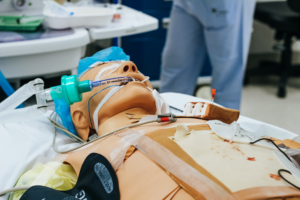
BSN Programs in Maryland
By EveryNurse Staff on June 14, 2021

Schools With BSN Programs in Maryland
- The University of Maryland, located in Baltimore, offers two main pathways for future graduates of a BSN degree program to follow. The first option is a traditional BSN program for students with no previous nursing degree. This program also provides an accelerated curriculum for those who already have a bachelor’s degree in a field other than nursing. Licensed RNs with a nursing diploma or associate degree in nursing will apply to the RN-BSN program, which is offered within a classroom setting or through courses that are taken completely online.
- Ranked as one of the most affordable colleges in Maryland, Coppin State University, located in Baltimore, educates students with an interest in earning a Bachelor of Science in Nursing. Courses are taken through the Helene Fuld School of Nursing, which boasts job offers for 100 percent of the school’s students – sometimes even before they are graduates. Interested parties may take courses through one of three BSN programs: Traditional (four-year) BSN, RN to BSN, and an Accelerated BSN for 2nd Degree Students. The nursing program at the university is accredited by the Commission on Collegiate Nursing Education.
- Students looking for accelerated BSN programs in Maryland will find two options offered at Johns Hopkins University in Baltimore: summer or fall entry. The Summer-Entry Accelerated Program starts in May and lasts for 13 months. Students in the Fall-Entry Accelerated Program begin school in August and have more flexibility with a 17-monthlong curriculum. Before applying to the programs, applicants must complete 17-20 credits (earning a grade B or better) in prerequisite coursework from an accredited college or university, which include classes in Statistics, Microbiology, and Nutrition.
- There are three different ways that a student may earn a BSN from Towson University: the basic program, RN-to-BS, and the Associate to Bachelor’s (ATB) Nursing Dual Enrollment program, where students earn both degrees in about 2 ½ years of year-round enrollment. The traditional, four-year program at the University is comprised of 120 credits for graduation; and students are eligible to apply for admission following the completion of a minimum of 42 undergraduate units (which include at least three laboratory science prerequisites and ENGL 102). Those interested in the RN-to-BS program will need to complete General Chemistry, Nutrition, and Microbiology before gaining acceptance into the nursing program. Taking Statistics is also a requirement before entering a Nursing Research course.
- Bowie State University offers a traditional four-year BSN program, as well as one geared towards registered nurses pursuing a Bachelor’s degree. Traditional nursing admission takes place in the Fall, where accepted applicants enter a program that consists of 124 credits (57 general education and 67 nursing credits). The RN to BS program track caters to registered nurses in the state of Maryland that possess an associate degree or nursing diploma. The program provides an online curriculum of ‘upper-division’ courses that typically takes two years to complete.
- With a commitment to providing a high-quality nursing education based on Christian values, the Edyth T. James Department of Nursing at Washington Adventist University, in Takoma Park, offers a BSN curriculum accredited by the Accreditation Commission for Education in Nursing. The program is designed for traditional 4-year students and centers on coursework that includes Pharmacology, and Concepts of Complex Health as core nursing classes. At the University, students must follow a dress code (a uniform shirt, pants and lab coat ordered through a specific retailer), which is required for the first week of classes.
- Salisbury University is home to three BSN degree tracks for first-degree students, RNs, and those seeking a second degree. The traditional four-year program sees students taking general education and foundational courses during the first two years at the school. The RN-to-BS program for registered nurses typically accommodates students who already have a previous Associate’s Degree or Diploma Degree in Nursing. This program generally takes two years of part-time study to complete. The 2nd BS degree program for non-nursing college graduates typically sees students completing their studies within three semesters of full-time study.
- Stevenson University offers an undergraduate pre-licensure and RN-BS program for those looking to earn a Bachelor of Science in Nursing degree in Maryland. Students generally jump-start their education by taking a one-credit New Student seminar in nursing in the fall, which provides freshmen and other new students the basics regarding achieving success in nursing at the school and upon graduation. Other courses available to BSN students attending the University include Intro to Clinical Nursing; Care of Children and Families; and Professionalism in Nursing.
Degree Guides
Maryland BSN Checklist
- Complete all pre-requisites and nursing core classes to earn a degree through an accredited BSN program at an on-campus or online college or university.
- Pass the National Council Licensure Examination-Registered Nurse (NCLEX-RN) exam in Maryland after graduating from a BSN program.
- Gain licensure as a registered nurse in Maryland– submit an application to the Maryland Board of Nursing, and pay the initial ~$100 fee. The Board also requires passport-style photos to accompany an application for licensure.
- To stay current with licensure, biennial renewal for the RN license is expected in Maryland – there are no continuing education requirements for RNs practicing in the state.
Maryland Nurse Salary & Job Outlook
Hospitals and doctor office personnel hiring new employees are more likely to consider the nurse who has a BSN over a candidate that does not. Employers often associate years of college coursework with an applicant possessing advanced skills, knowledge, and more experience. In Maryland, the U.S. Bureau of Labor Statistics (BLS) reports that registered nurses with a BSN often earn a median salary of $71,090 throughout the state.
While the majority of nurses will earn their Bachelor of Science in Nursing on a college campus, not everyone will take courses in the traditional classroom setting. An increasing number of students are now taking advantage of the benefits that come with earning an online BSN degree in Maryland, such as flexible class schedules and minimal transportation costs.







